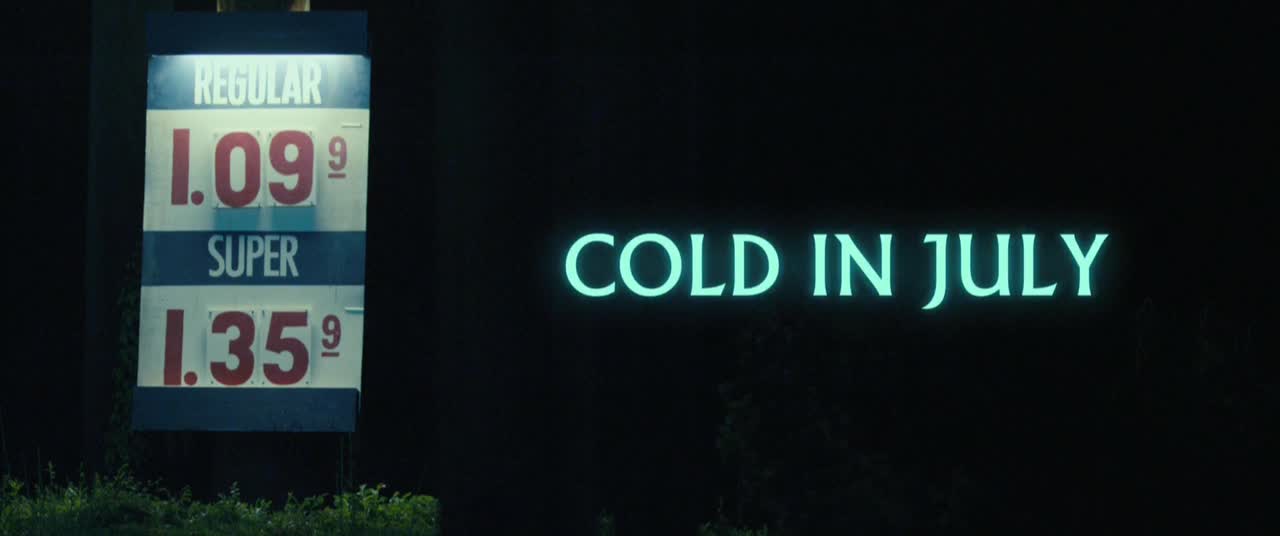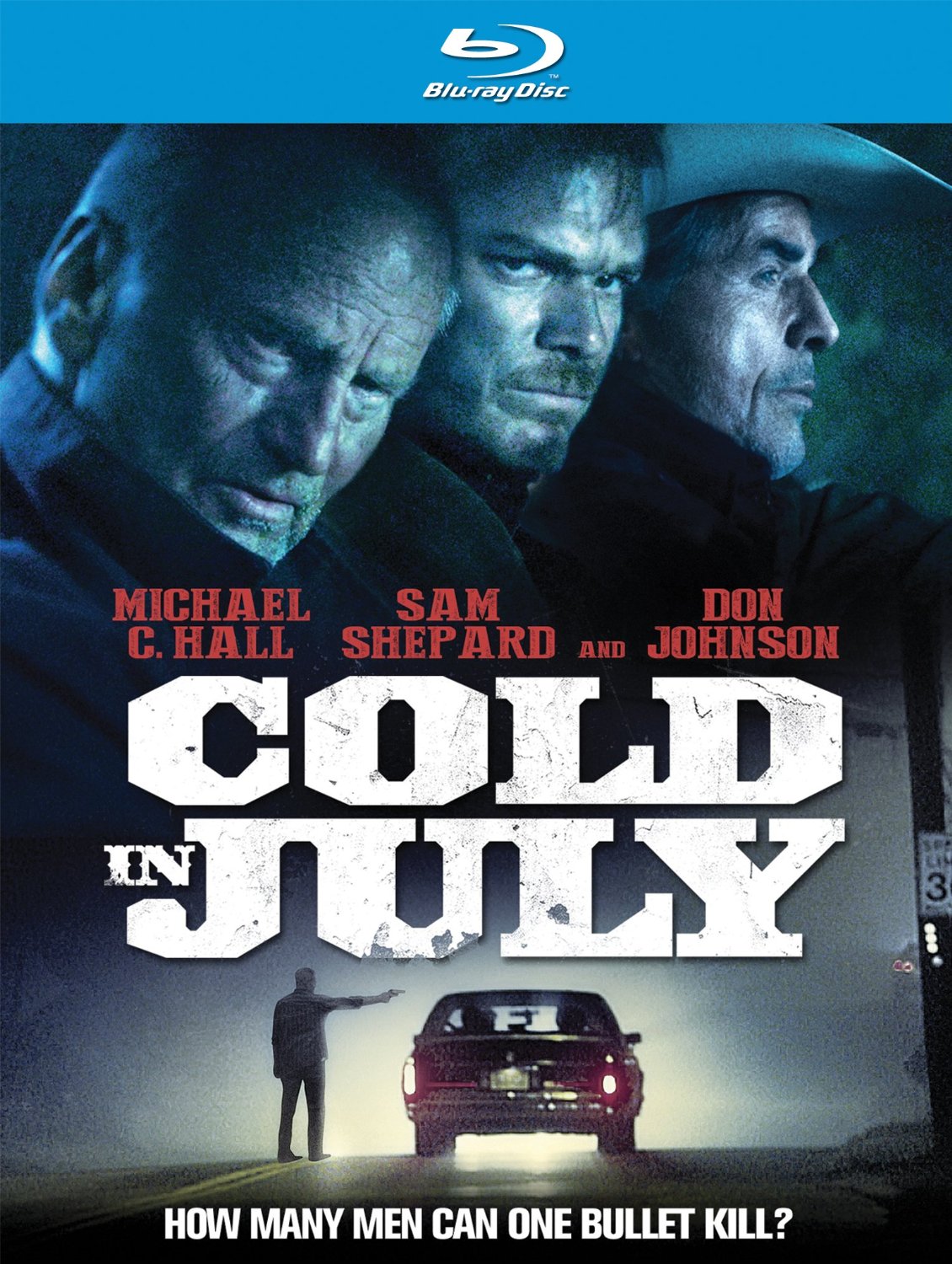
 BUY FROM AMAZON: CLICK HERE!
BUY FROM AMAZON: CLICK HERE!
MSRP $29.98
RATED R
STUDIO MPI Home Video
RUNNING TIME 110 Minutes
• Cast & Crew Commenary
• Deleted Scenes (With Optional Commentary)
• Early Previsualization Tests (With Optional Commentary)
• Isolated Score
• Trailer
The Pitch
The director of Stake Land and the writer of Bubba Ho-Tep come together to make a hypnotically compelling, if a tad uneven, crime story.
The Humans
Michael C. Hall, Sam Shepard, Don Johnson, Wyatt Russell, Nick Damici
The Nutshell
How can a split-second decision change your life? While investigating noises in his house one balmy Texas night in 1989, Richard Dane puts a bullet in the brain of lowlife burglar Freddy. Although he’s hailed as a small-town hero, Richard soon finds himself fearing for his family’s safety when Freddy’s ex-con father, Ben, rolls into town, hellbent on revenge. But not all is as it seems in this seemingly peaceful community, and soon Richard’s life begins to unravel into a dark underworld of corruption and violence that will pit him against the most unlikely of foes.
The Lowdown
Before I start here, let me just say that Joe R. Lansdale (the writer of the novel which this film was based on) is one of the greatest living authors. He writes weird pulpy stuff with an amiable and folksy manner that hides a mean-spirited and sharp wit. His two most common genres are horror and crime, but he’s dabbled in a little bit of everything. Regardless of your genre taste, I recommend giving him a try. Novels/short story collections to look out for: Bumper Crop, A Fine Dark Line, The Bottoms, The Drive-In, Writer of the Purple Rage (Bubba Ho-Tep and Incident On and Off a Mountain Road appear in this).
Cold in July is the third feature-length film based on a Joe R. Lansdale story; the first two being 2005’s Bubba Ho-Tep directed by Don Coscarelli and starring Bruce Campbell and Ossie Davis and 2012’s Christmas With the Dead directed by T.L. Lankford. (His short story Incident on and Off a Mountain Road was also made into the premiere episode of the Showtime series Masters of Horror, also directed by Don Coscarelli). This is the third feature-length film by director Jim Mickle following the surprisingly watchable Mulberry Street, the underrated Stake Land, and the uneven We Are What We Are.
Lansdale’s easy-going prose fits Mickle’s quiet directing style impeccably and it pleases me to see that both creators’ voices (as well as Nick Damici who has written and acted in all of Mickle’s movies) are equally distinguishable in the finished product. I daresay this is Mickle’s strongest effort thus far and if he continues to grow as much between projects as he has between his last three then he has a bright future ahead indeed. (IMDb lists Mickle’s next project as being a television show based on Lansdale’s Hap and Leonard series of crime novels, which excites me quite a bit.)

“THAT was how they decided to end Dexter?!”.
Cold in July isn’t nearly as esoteric or pulpy as any film that Lansdale or Mickle have been associated thus far, but what it lacks in overt oddness it makes up with one of the most bizarre narrative structures I have yet seen. The movie is ostensibly about Richard Dane (Dexter’s Michael C. Hall), who wakes up one balmy East Texas summer night in 1989 to an intruder in his home. Dane pulls a pistol from a shoe box in his closet and gets the drop on the intruder who stands still and stares at him as he, accidentally or intentionally it’s never clear, shoots the burglar through the head.
Dane is lauded as a hero by everyone, including the town’s sheriff (Nick Damici) who assures him that the man he killed was a humongous scumbag wanted all over the state, but he feels guilty and shaken. The opening of the movie explores the psyche of Dane as he tries to come to terms with what has happened: replacing the blood-stained couch that the burglar died on, buying expensive security systems and bars for his windows, and even attending the funeral of his potential attacker/victim. It’s at the funeral that the burglar’s recently paroled father, Ben (Sam Shepard), comes up to Dane’s car and informs him, in no uncertain terms, that this movie is now a Cape Fear remake.
The movie becomes tense and suspenseful as Dane works in vain to keep the vengeful ex-con father away from his family, but soon the movie changes again to a conspiracy movie. Now, enter an eccentric private investigator/pig farmer named Jim Bob Luke (Don Johnson) and suddenly this is a movie about a group of men taking down a crime syndicate. The story is all over the place and, while each section is enjoyable and engaging, the end of the movie leaves the viewer questioning how on Earth we got from there to here. It’s not even as if the story is hard to follow, there’s a very clear through-line but the movie switches feel and sub-genre so much that it feels less like a static story and more like a series of escalating misadventures caused by Dane’s stupid insistence to do the “right” thing.

“Did you really just do a joke about the end of Dexter?”.
Now, I have not read Cold in July, so I don’t know how faithful the movie is to the source material, but this feels like a Joe R. Lansdale story from top to bottom and his narratives do have a tendency to be a sort of rambling stream-of-consciousness mess. This feels like one of his weaker works and, assuming the time period the movie takes place in is the time that the novel was written (which is likely), I would say that’s not really a surprise as his early period books lacked the strong voice and punchy humor of his later books. The biggest flaw by far is Dane’s reduced role in the story as it progresses. Spoilers abound for the rest of this section, skip ahead to the paragraph below the next picture if you don’t want to know major plot points.
There seem to be narrative bookends with Dane waking up nervous at the beginning of the movie before going out and shooting a supposed bad guy and the peaceful way he climbs into bed at the end of the movie after helping to kill a confirmed bad guy. The problem is that this symmetry really doesn’t work; the man Dane thinks he kills is the actual villain (for lack of a better one) of the movie, and it would’ve made a lot of sense for Dane to be the man who finally puts a bullet in the brain of the man he thought he killed earlier. But it isn’t Dane who kills Freddy (Wyatt Russell), it’s the man’s father. Richard Dane could just leave the movie after about halfway in and the narrative would be just fine without him, in fact there are two points that seem to acknowledge this problem. Sure he kills one of Freddy’s co-horts and arguably his involvement causes the death of Freddy, but it seems like a cop-out. Dane really kind of stops developing as a character and just kind of becomes the audiences’ eyes and ears, which probably worked a lot better as a first-person narrative in a book.
There’s also a fair amount of dropped plot threads that bugged me. Dane saves Ben’s life after the sheriff and some other men tie him up and leave him on the train tracks for dead. Jim Bob digs up proof that this was in an effort to fake Freddy’s death because he’s in witness protection, but Freddy is running a snuff film empire with no oversight or intervention, implying a level of corruption. There’s no way the three men aren’t being watched as they carry out their plot to kill Freddy and his business partners, yet the movie never bothers to acknowledge this.

*Waits patiently to be asked about who he had sex with on the set of Nash Bridges.*
I will, as many other already have, praise the score by composer Jeff Grace which is very John Carpenteresque and very 1980s sounding. It has an electric synth style that’s at times a bit over-wrought for the movie but works well with Ryan Samul’s neon-laced pop art cinematography which is less Carpenter-esque and plays more like a mash-up of vintage Walter Hill with a bit of Nicholas Winding Refn. My only complaint on the cinematography front is that there’s an over-use of split diopter shots, which are super distracting in HD.
Michael C. Hall doesn’t do much for a large chunk of the movie but I think that’s more a fault of the narrative than his actual ability. In the first half of the film he gives a very sincere and human performance as a man eaten up with guilt and fear. Sam Shepard pulls the Max Cady roll with aplomb and comes off as credibly scary, but also gives a very vulnerable and human performance. Don Johnson as ever manages to be both bombastic and understated and remains one of the most consistently solid performers in the industry. Wyatt Russell still shows a lot of promise but once again fails to land a juicy enough role for me to see if he inherited anything from his father other than a jawline and a winning smile.
Cold in July has some story issues and is best viewed without too high of hopes, but it is a very good movie. I would say Cold in July is just shy of being a great movie and shows that Jim Mickle is still a name to look out for. It’s suspenseful, honest, and thought provoking while being hypnotic and interesting to a fault, and it’s definitely worth your time.
The Package
There’s lots to love here. We have two separate audio commentaries: The first (featuring Jim MIckle, Michael C. Hall, and Nick Damici) discusses casting and the way the performers worked together with their different styles of acting, the second (featuring Jim Mickle, Cinematographer Ryan Samul, Jeff Grace, and Producer Linda Moran) talks more about the production and a lot more of the behind-the-scenes technical stuff. There is an isolated score by Jeff Grace, which is delightful. There are previsualization tests with optional commentary that shows how the film was “storyboarded.” There is a Q&A taken after a showing of the film with Joe R. Lansdale and Jim Mickle (George R. R. Martin, who owns the theater in which the showing takes place, also attends.) Also there’s a trailer for the movie as well as trailers for God’s Pocket, Venus in Furs, Hellion, and Lucky Them which play before the menu screen.
Rating: 




Out of a Possible 5 Stars
P.S. Here’s a link to Amazon’s Joe R. Lansdale page.